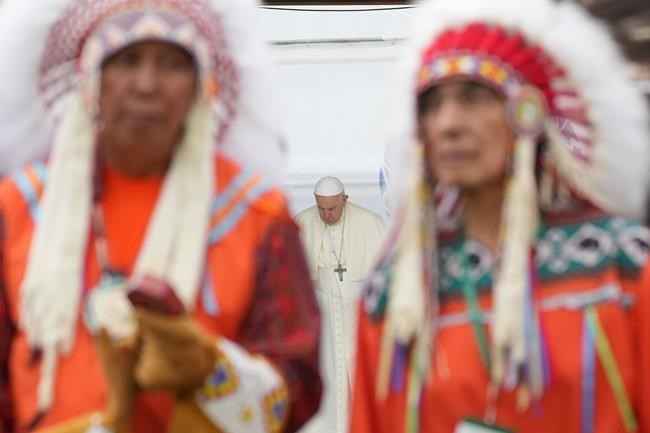The Vatican has formally denounced a 15th-century doctrine used to legitimize the seizure of Indigenous land, but the national chief of the Assembly of First Nations says the Roman Catholic Church should go further to repair the harm caused by the decrees.
A statement from the Vatican on Thursday said the papal bulls used as the basis for the Doctrine of Discovery "did not adequately reflect the equal dignity and rights of Indigenous peoples."
The papal bulls were connected to the idea that lands being colonized were empty, when in fact Indigenous people had long called them home.
"The world was told that we were unworthy and that our lands were empty," National Chief RoseAnne Archibald said in a phone interview Thursday.
"We need the world to know that we are worthy, that we are valuable."
Archibald said the Vatican's words are a step in the right direction, but the Catholic Church should introduce a new statement affirming the value of Indigenous Peoples.
She also called for the church to return land and sacred items to First Nations.
Chief Bobby Cameron of the Federation of Sovereign Indigenous Nations, which represents 73 First Nations in Saskatchewan, said in a statement the legal doctrines "allowed Canada to unilaterally claim sovereignty over our peoples and our lands and further used it as an excuse to commit genocide.
"Today, the Vatican finally said what our peoples have always known."
More than 500 years ago,popes beganissuing a series of edicts, known as papal bulls.
The Truth and Reconciliation Commission of Canada, which investigated residential schools in Canada, said they helped shape the political and legal arguments that became known as the Doctrine of Discovery.
The commission's final report included a call to action for all religious denominations "to repudiate concepts used to justify European sovereignty over Indigenous lands and peoples, such as the Doctrine of Discovery."
Last March, First Nations, Métis and Inuit groups went to Rome to meet with Pope Francis. Francis apologized for the church's role in residential schools, but delegates also told him the doctrine must be rejected.
The pontiff travelled to Canada in July for a six-day tour, during which he apologized again for residential schools and was criticized for not addressing the papal bulls. Throughout his stops in Alberta, Quebec and Nunavut, people held signs and yelled for the Pope to reject the doctrine.
The Confederacy of Treaty 6 First Nations said in a statement that rescinding the doctrine was one of the most prominent requests from residential school survivors when Pope Francis was hosted on its territory in central Alberta. They called the move a significant step on the journey to reconciliation.
Donald Bolen, the Archbishop of Regina, said Indigenous people made it clear that the Vatican needed to address the issue.
"The language in those bulls is deeply wounding and problematic, and there was a desire for the Holy See to address it, and they have."
The Canadian Conference of Catholic Bishops, of which Bolen is a member, said in a statement that it's grateful Indigenous organizations urged the move. The conference signed a statement calling for the church to reject principals associated with the doctrine in 2016.
Bolen said the Vatican's statement Thursdayshows Francis was listening to Indigenous people during their meetings at the Vatican and throughout his time in Canada.
"I think there's no doubt that it's a response given at the request of Indigenous people in Canada," he said.
The statement from the Vatican, however, said the doctrine is not part of the teachings of the church and the documents were "written in a specific historical period and linked to political questions."
The Vatican said the contents of the documents were manipulated for political purposes to justify "immoral acts against Indigenous Peoples."
"It is only just to recognize these errors, acknowledge the terrible effects of the assimilation policies and the pain experienced by Indigenous peoples, and ask for pardon."
Cody Groat, who is Mohawk from Six Nations in Ontario and an Indigenous studies professor at Western University, said implying that the church never advanced the doctrine shifts the blame.
Groat, who is also seeking to be the federal NDP candidate in a rural Ontario riding, said the statement suggests the Vatican recognizes it is in "a period of global reckoning" and had to take this step "in order to stay relevant."
Archibald agreed that there's a direct connection between governments, sovereign crowns and the church.
"These papal bulls granted those rights to colonizing sovereigns," the national chief said.
Indigenous Services Minister Patty Hajdu said Thursday the federal government will be taking a closer look at the Vatican's statement to see what next steps it might take.
"For a long time I think Canadians have known and the government of Canada has known that the colonialism that Indigenous Peoples have faced for over 150 years have had devastating consequences."
This report by The Canadian Press was first published March 30, 2023.
Kelly Geraldine Malone and Stephanie Taylor, The Canadian Press
Note to readers: This is a corrected story. A previous version said Pope Alexander XI issued the first papal bulls.



